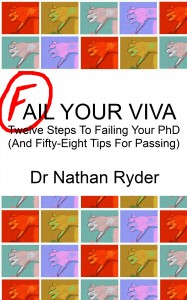Fate Accomplished
“What determines your fate in the viva?” is one of the more unusual questions I’ve been asked in seminars.
- Could it be your topic? Perhaps you need to choose something that resonates with your examiners and others.
- In which case, could it be your examiners? Maybe you need the “right” ones to listen to you, read your work and ask the “right” questions.
- So maybe the biggest element is your supervisors? Their mentoring helps develop you and your thesis over many years.
- But then surely it has to be your thesis, right? A great thesis means you’ve shown yourself in a good light.
The common factor is you. You undertook the topic, you wrote your thesis, you worked with you supervisor and you’ll answer your examiners in the viva. It might be overreaching to claim you determine your fate in the viva, but you’re definitely the biggest factor of your own success.
(Apologies for the title! It just jumped out at me!)
